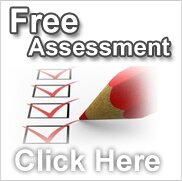Attention Deficit Disorder or Attention Hyperactive Disorder and Addiction
 It is common for people with ADD or ADHD to turn to addictive substances such as alcohol, marijuana, heroin, prescription tranquilizers, pain medication, nicotine, caffeine, sugar, cocaine, and street amphetamines in an attempt to soothe their restless brains and bodies.
It is common for people with ADD or ADHD to turn to addictive substances such as alcohol, marijuana, heroin, prescription tranquilizers, pain medication, nicotine, caffeine, sugar, cocaine, and street amphetamines in an attempt to soothe their restless brains and bodies.Another way for ADD or ADHD individuals to soothe their pain is to use food as therapy, as eating can temporarily calm ADD or ADHD's physical and mental restlessness. As the individual's brain is not quick to contain impulses, he or she may compulsively eat without thinking. For some, overeating becomes a compulsion, where food functions as a tool to alter their feelings rather than to satisfy their hunger. Compulsive overeaters tend to crave foods high in carbohydrates, sugars, and salt. For more information on the subject visit our eating disorder treatment page.
By using substances or food to improve their abilities, help them feel better, or numb their feelings, individuals with ADD and ADHD are doing what is called self-medication. The problem with self-medicating is that although it feels comforting at first, it will bring on a host of addiction-related problems. What starts out as a "solution," can cause unforeseen problems such as addiction, impulsive crimes, domestic violence, increased high risk behaviors, lost jobs, relationships, families, and death. Too many people with untreated ADD and ADHD, or learning/perceptual disabilities, are often incarcerated and misunderstood whilst suffering from co-occurring addiction. So, it is important that when we see ADD or ADHD, to be attentive of possible substance abuse, as well as addictions and eating disorders; likewise, when we see substance abuse or addictions and eating disorders, doctors and loved ones should keep an eye out for possible ADD or ADHD conditions.
ADD and ADHD Often Times Lead to Substance Abuse
Once a person has ADD or ADHD, and begins to self medicate using food, cocaine, heroin, alcohol, prescription medications, or other drugs, they may feel like their symptoms have decreased. The person may feel calm, happy, and may be able to sleep calmly. Once binge eating does not work anymore, or the drugs wear off, the ADD or ADHD symptoms return, sometimes even worse than before. The individual who abuses substances will continue to use, and eventually build up a tolerance; this means that eventually, they will require more of the drug to get the same effect. The person suffering from ADD or ADHD will ultimately develop an addiction.Who Will Become Addicted?
Everyone is vulnerable to abusing any mind-altering substance to diminish the struggling feelings that accompany ADD and ADHD. There are a variety of reasons why one person becomes addicted and another does not. No single cause for addiction exists; rather, a combination of factors such as genetic predisposition, neurochemistry, family history, trauma, life stress, and other physical and emotional problems may contribute. People may have genetic predispositions for alcoholism, but if they choose not to drink they will not become an alcoholic. The same is true for drug addictions. If an individual never smokes pot, snorts cocaine, shoots or smokes heroin, he or she will never become a pot, coke, or heroin addict. The bottom line is that people with ADD or ADHD as a whole are more likely to medicate themselves with substances and develop an eating disorder than those who do not have ADD or ADHD.Treating Both the Addiction and ADD or ADHD at A Center for Addiction Recovery
In addition to our regular therapeautical addiction treatment programs, A Center for Addiction Recovery will help clients with addiction and co-occurring ADD or ADHD with:- A professional evaluation for ADD or ADHD, and co-occurring addiction
- Education on how ADD or ADHD impacts their lives, and the lives of their loved ones
- Building social, organization, communication, work, and school skills
- ADD, ADHD coaching and support groups
- Closely monitored medication when medication is indicated





